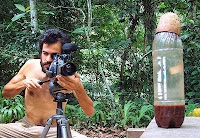Jerónimo M. M. is a professor of interactive TV and mobile applications, as well as a consultant on Internet video, online communities, and user experience for such clients as MTV, Tele5, The Movie Channel, and Telefonica. For the past seven years he has been working on a documentary film project entitled The Ayahuasca Conversation.
 |
The Ayahuasca Conversation is intended to explore ethnobotany, pharmacology, and the roots of faith. The project began, Jerónimo says, “with filming the way in which indigenous peoples have protected themselves from acculturation by hiding their traditions back inside the religions of the colonizers.” This focus then expanded into a consideration of “the process by which religions are created and lead invariably to healing, to that point of human history where medicine and religion were not separate things,” and then into traditional medicine.
“We have traveled a dozen countries and three continents,” Jerónimo writes, “interviewing priests and shamans, scientists and curanderos, intellectuals and illiterate farmers, leading thinkers and anonymous people whose lives have been transformed by their encounter with these worlds. We have filmed otherworldly rituals and extraordinary behaviors that at the same time manifested something that seemed universal to all mankind.”
 |
Jerónimo refuses to create a conventional documentary out of his hundreds of hours of film. Rather, he intends to create one- to seven-minute pieces, spread virally, designed for cross-media versatility and able to be repackaged into varying lengths.”These videos,” he says, “are embedded into an innovative living interface: a plant-based ecosystem that thrives or withers, branching from the central narrative and unlocking batches of additional content that grows increasingly intimate. This project is ongoing and participatory: the long-term investment allows users a feeling of inclusion into the process of the documentary.”
The evolving project is thus what he calls “a stylized narrative of serial webisodes” — a proposed gigantic online video archive where viewers can consult portions of the film at their own pace. The idea is eventually to transcribe the interviews and tag the videos, so that people can follow their own threads through the material, find interviews where a particular topic is mentioned, queue the video segments for viewing one after another — in effect, create their own documentaries. There may be a number of predefined paths through the material, but the user could jump off the path at any time and then return to the central thread — the diary of an addict undergoing transformation.
The documentary project is also multiplatform — the films, a collection of documents, and a bilingual blog, named Legitimos Guerreritos, which incorporates a wide variety of documentary videos. I am a big fan of this blog. The posts are always thoughtful, interesting, and filled with content — the penetration of Santo Daime among indigenous Cashinahua in Acre, Brazil; the work of cognitive anthropologist Josep María Fericgla on shamanism and ayahuasca; a response to a video showing teenagers drinking ayahuasca in their living room; the culture of the Kogi of Colombia. There are not many of them, but every one is worth a careful reading.
 |
As intended, a few of Jerónimo’s films have achieved wide circulation — including the video discourse by Jacques Mabit I posted here — although far too little footage has actually found its way onto the Internet. The following example is a more-or-less extemporaneous talk that Jerónimo himself gave in July 2007 at the Third Amazonian Shamanism Conference in Iquitos.
While attending the conference, he says, “I saw people that in my opinion were not properly prepared, make a farce, a theater play, out of something I respect and love very much, the work and practices of Amazonian curanderismo. All in order to feel better about themselves in front of people who didn’t know any better … That mix of the good and the bad is certainly an integral part of Iquitos ayahuasca scene.” His critique of the commercialization and distortion of shamanism is well worth listening to.

- Previous Post: A Golden Guide to Hallucinogenic Plants
- Next Post: Soul Ayahuasca
- More Articles Related to: Ayahuasca, Sacred Plants, The Medicine Path



Awesome post, Steve. Thanks for sharing it.